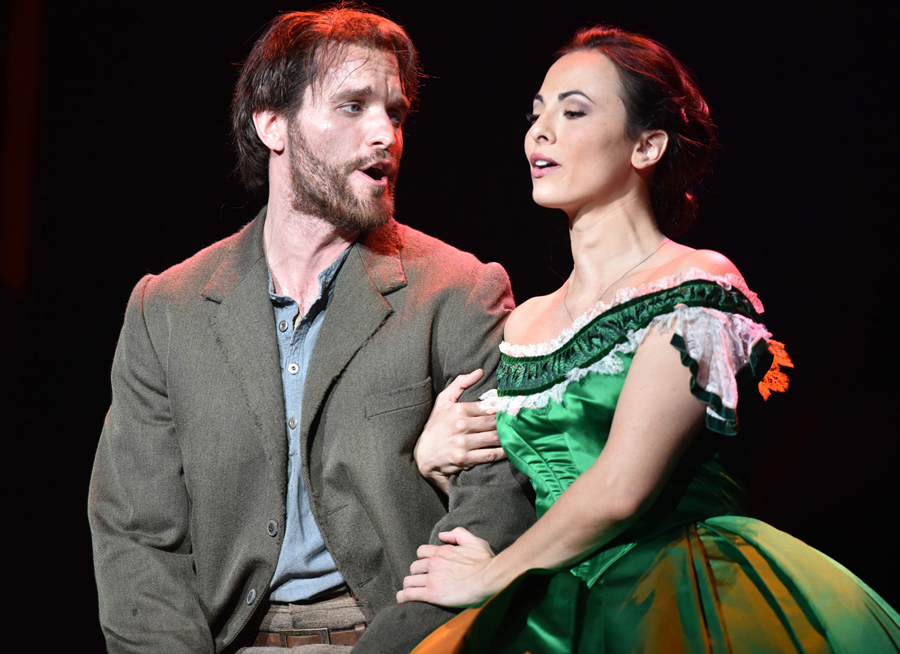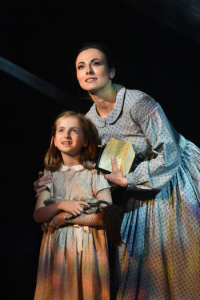
Cold Mountain. Opera by Jennifer Higdon. Opera Philadelphia, 2016.
*
Cold Mountain is best appreciated when you think of it as an intimate, lyric musical story rather than a big spectacle. Try to erase the knowledge that it’s based on a huge-selling novel and a wide-screen movie.
That’s not easy — the opera has a large cast and massive set — but Cold Mountain’s rewards come from the intimacy of the plot and the characters. In a sense, the mountain thaws out when you approach it from a different perspective.
A lack of that focus led to a negative review by the New York Times, and to the mixed reactions from David Patrick Stearns in the Philadelphia Inquirer and me, here, https://theculturalcritic.com/cold-mountain-a-bit-too-chilly/ when the opera premiered in Santa Fe in August of 2015. The production was physically the same, but the enclosed confines of the Academy of Music gave it a more intimate presence, as did the lyrical conducting of Corrado Rovaris, who was not involved in Santa Fe.
Charles Frazier’s story, with libretto by Gene Scheer, is about the Civil War soldier W.P. Inman (Jarrett Ott) who deserts from the Confederate army to travel home to his North Carolina mountain.
A similar earlier concept was Kurt Weill and Maxwell Anderson’s Ulysses Africanus, a theatrical collaboration that combined the Odyssey with a lost African American slave trying to find his way home during the Civil War. The project was abandoned in 1939. Only the song “Lost in the Stars” remains from it.
Inman’s trials are reminiscent of Homer’s Odyssey, but not as monumental as Ulysses’ adventures with Calypso, Circe, Cyclops and the Lotus-Eaters. Inman meets earthy characters like a bounty hunter who’s seeking Confederate deserters, an escaped slave who hates all white people, and a widowed mother who craves sleeping in a man’s arms.
He carries the memory of Ada Monroe (Isabel Leonard), a minister’s daughter whom he met just before the war began. As four years go by, and the constellation Orion repeatedly rises and falls from view, Inman wonders whether he can resume a normal life with the woman he loves after experiencing the horrors of war.
Higdon has the background to depict the milieu; she grew up in the Blue Ridge mountains of Tennessee. Her score establishes landscape, sounding like good film background music. Sheepishly, her orchestra often echoes words that have already been spoken. A character remarks about rain and the orchestra follows with the sounds of falling raindrops. Another person sings about birds and we hear flutes.
Higdon’s music and Gene Scheer’s words capture the rhythms of the speech and the personalities of the characters. To her great credit, Higdon writes rich orchestral textures yet never lets the instruments cover the singers’ voices. Every word of the text is clear, and this is no small feat.
Ott has a gentle, high baritone voice which is ideal for Inman’s music, and his youthful age of 28 is an asset. (Ott was the leading man during the opera’s workshop four years ago. Here he replaced the stage-premiere Inman, Nathan Gunn.) Leonard has a medium-weight mezzo voice that suits the sweet Ada.
I do miss the lack of a soliloquy or an aria for the central character, and the dearth of expansive opportunities for the other singers. It would be natural for Inman, all alone for long periods, to ruminate on his feelings; and for the audience to hear a real aria. Higdon’s orchestra provides most of the expressivity, more so than the singers. Playwright Albert Innaurato summed things up when he wrote that Higdon “doesn’t seem to know how to use music as the engine of a dramatic work, singing as a way to create characters, or how to suspend time to allow for eloquent vocal and musical expression of emotion.” Higdon has composed excellent songs, but this is her first opera.
I still feel, as I wrote at the time of the Santa Fe premiere, that Higdon was too cautious in using regional color.
Because of the setting, I hoped for evocations of rural life like Samuel Barber’s Knoxville Summer of 1915 or Aaron Copland’s Appalachian Spring. That never happens. The best parts of Cold Mountain are an Act I chorus about fallen soldiers, a richly-developed Act II chorus about people buried and forgotten, and a bluegrass fiddle trio about trying to forget the war (“The garden might be wrapped in ice but I still smell the rose.”)
Higdon’s instrumental and choral writing is transparent, with slight echoes of Benjamin Britten. The opera’s opening and closing scenes are soft, reinforcing my opinion that the opera is best enjoyed for its quiet pleasures and for its introspective examination of how war affects individuals.
In addition to the two leads, strong contributions come from Cecelia Hall as Ruby, a spunky girl who teaches Ada how to survive; Kevin Burdette as Ruby’s errant father; Jay Hunter Morris as the bounty hunter Teague; Paul Groves as a hypocrite preacher; Rachel Sterrenberg as the lonely widow, and Marietta Simpson as the escaped slave.
(Simpson is a superb, mature artist, but Deborah Nansteel in Santa Fe created a more fierce and threatening woman. See the photo accompanying my earlier review.)
The role of Ruby is intriguing. In the novel she’s depicted as being bi-racial, which would have made her close relationship with Ada scandalous in the 1860s. In addition, there’s a hint that Ada and Ruby may have had a lesbian experience. This is left ambiguous in the book and in the opera.
The evocative lighting by Brian Nason deserves special praise. It was even more effective here than in Santa Fe, probably because it had no competition from the surrounding mountains at twilight.
It also is helpful to set aside the fact the composer is a Pulitzer Prize-winner for her orchestral writing. Instead, realize that this is Higdon’s first opera and, as she admits, was learning the craft as she went along. The first operas by Verdi, Wagner and Puccini (the almost-forgotten Oberto, Die Feen and Le Villi) are more legitimate objects for comparison than those composers’ later operas.
A 2 CD album of the opera’s Santa Fe production is available from Pentatone Records (http://www.pentatonemusic.com/) 
On the right, Francesca Luzi with Isabel Leonard:
An earlier version of this review appeared in Broad Street Review.
Please share your thoughts and your opinions with us. Address to editor@theculturalcritic.com